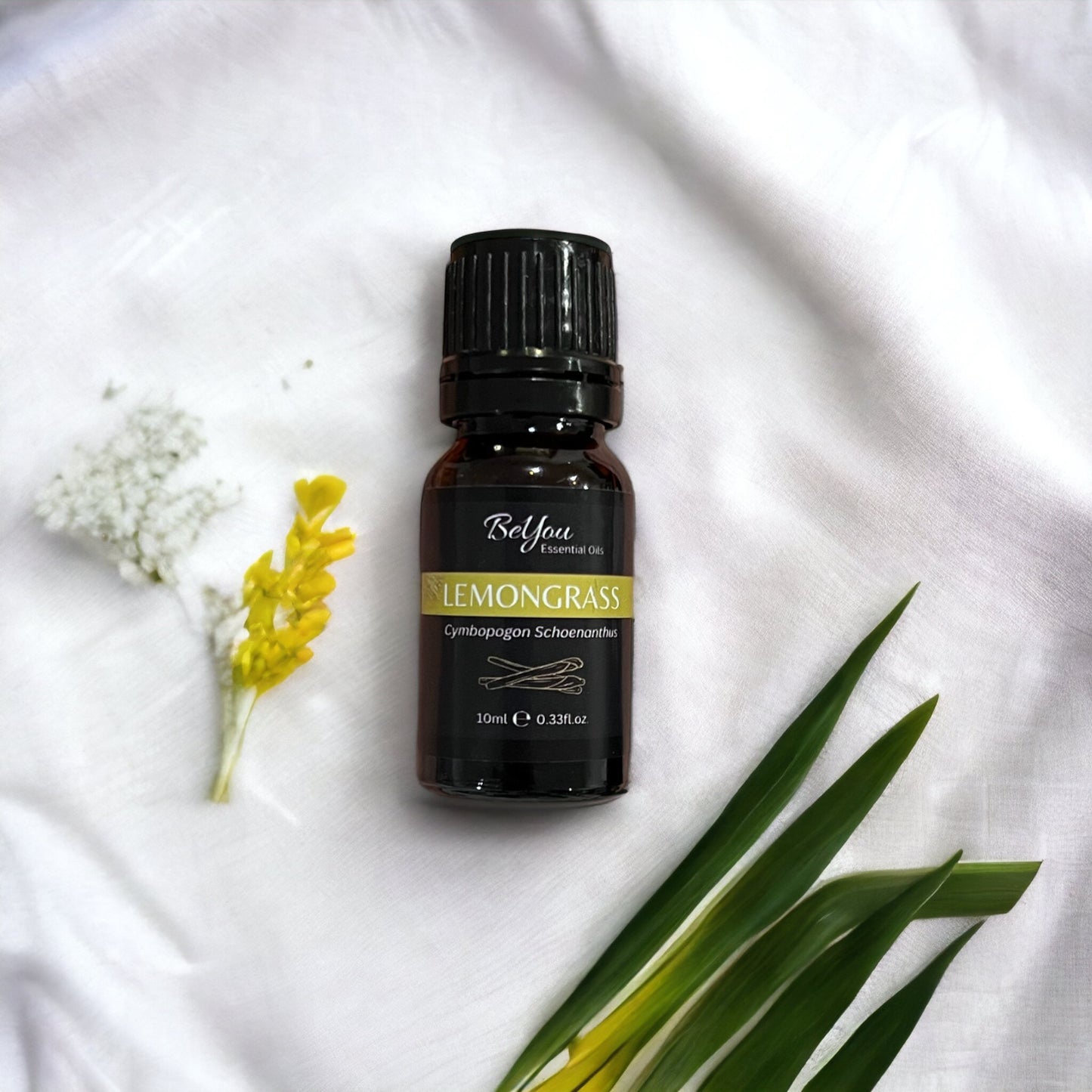Lemongrass Pure Essential Oil
Lemongrass Pure Essential Oil
Low stock: 2 left
Couldn't load pickup availability
DESCRIPTION
DESCRIPTION
Lemongrass Essential Oil, derived from the aromatic grass Cymbopogon citratus, is highly valued for its refreshing and uplifting properties. Known for its citrusy and lemony scent, this essential oil offers a range of benefits for both the mind and body.
Benefits:
- Invigorating and energizing: Lemongrass oil has a rejuvenating and stimulating effect on the mind and body. It can help boost energy levels, improve focus, and uplift the mood, making it an excellent choice for combating mental fatigue and promoting overall well-being.
- Natural insect repellent: Lemongrass oil is known for its insect-repellent properties. Its strong aroma acts as a deterrent for mosquitoes and other insects, making it a popular choice for natural bug sprays and candles.
- Skin health: With its astringent and purifying properties, Lemongrass oil can help promote clear and healthy-looking skin. It is often used in skincare routines to address acne, excessive oiliness, and other skin concerns.
- Digestive support: Lemongrass oil has been traditionally used to support healthy digestion. It may aid in relieving digestive discomfort, reducing bloating, and supporting a balanced digestive system.
PRODUCT DETAILS
PRODUCT DETAILS
Botanical Name: Cymbopogon Schoenanthus Oil
Derived from: Leaves
Origin: India
Extraction: Steam Distilled Essential Oil
Note: Middle to top note
Aroma: Lemony, fresh and grassy with earthy undertones
- Vegan
- Non-GMO
- Not tested on animals
- Halal
- No carrier oils, 100% pure essential oil
Size: 10ml
DIRECTIONS FOR USE
DIRECTIONS FOR USE
Usage:
- Aromatherapy: Add 4-6 drops of Lemongrass oil to a diffuser filled with water according to the manufacturer's instructions. Diffuse the oil for an invigorating and uplifting ambiance, especially during times of low energy or to freshen up the air.
- Topical application: Dilute Lemongrass oil in a suitable carrier oil, such as coconut or jojoba oil, at a recommended dilution of 2-5%. Apply the diluted mixture to the skin for massage or target specific areas for its skin-clarifying properties.
- Natural insect repellent: Dilute Lemongrass oil in water or a carrier oil and apply it to exposed areas of the skin to repel insects. Alternatively, you can create a spray by combining Lemongrass oil with water and a natural emulsifier.
- Disinfectant: To disinfect your sink or dishwasher, add a few drops of Lemon Essential oil to your sink or into the filter of your dishwasher. This will create a sanitary and pleasant atmosphere for your dishes and dishwasher. Alternatively, add a few drops to wipes or a wet kitchen cloth to disinfect tabletops and countertops.
BLENDS WITH
BLENDS WITH
Blends well with:
Lemongrass Essential Oil blends well with various other essential oils, including:
- Peppermint: for an invigorating and cooling blend.
- Lavender: for a calming and balancing combination.
- Eucalyptus: for a refreshing and respiratory-supportive blend.
- Geranium: for a floral and uplifting aroma.
- Tea Tree: for a purifying and immune-supportive blend.
SAFETY PRECAUTION
SAFETY PRECAUTION
Safety precautions:
- Conduct a patch test before using Lemongrass oil topically to check for any skin sensitivities or allergies.
- Avoid applying undiluted Lemongrass oil directly to the skin, as it can cause skin irritation in some individuals.
- Lemongrass oil is not recommended for use during pregnancy or for individuals with sensitive skin.
- If you have any specific health concerns, medical conditions, or are taking medications, consult with a qualified healthcare professional or aromatherapist before using Lemongrass oil.
- Keep Lemongrass essential oil out of reach of children and pets.
- Store the oil in a cool, dry place, away from direct sunlight.

FAQs
-
What are essential oils?
Essential oils are highly concentrated plant extracts that capture the natural fragrance and beneficial properties of plants. They are typically obtained through processes like steam distillation or cold-pressing of various plant parts such as leaves, flowers, stems, or roots. Essential oils are known for their aromatic qualities and are commonly used in aromatherapy, personal care products, and natural remedies. -
How are essential oils used?
Essential oils can be used in several ways. Here are a few common methods:
- Aromatherapy: Inhalation of essential oils using diffusers, steam inhalation, or adding a few drops to a bowl of hot water.
- Topical application: Diluting essential oils with carrier oils (such as coconut or jojoba oil) and applying them to the skin for massage or skincare purposes.
- Internal consumption: Some essential oils are safe for internal use, but it is crucial to consult a qualified professional before ingesting them, as not all oils are suitable for internal consumption.
-
What are the potential benefits of essential oils?
Essential oils are believed to offer a range of potential benefits, but it's important to note that scientific research on their effectiveness is still evolving. Some commonly cited benefits include:
- Aromatherapy for relaxation, stress relief, and mood enhancement.
- Skin and hair care: Many essential oils are used in skincare products for their potential antimicrobial, anti-inflammatory, and soothing properties.
- Natural cleaning: Some essential oils possess antimicrobial properties and can be used as natural alternatives for household cleaning products.
- Potential respiratory support: Certain essential oils, such as eucalyptus or peppermint, are known for their potential respiratory benefits when inhaled.
-
Are there any risks or precautions associated with essential oils?
While essential oils are generally safe when used properly, there are a few important considerations:
- Skin sensitivity: Some essential oils can cause skin irritation or allergic reactions, especially when used undiluted or on sensitive skin. Always perform a patch test and dilute oils before applying them topically.
- Inhalation precautions: Not all essential oils are safe for inhalation, especially for individuals with respiratory conditions or sensitivities. Certain oils may trigger allergies or respiratory distress.
- Internal use: Internal consumption of essential oils should only be done under the guidance of a qualified professional. Many oils are toxic when ingested, and improper use can lead to adverse effects.
- Pregnancy and children: Some essential oils are not safe for use during pregnancy or on young children. It's crucial to consult healthcare professionals or certified aromatherapists for guidance in these situations.
Remember, it's always wise to consult with a healthcare professional or aromatherapist before using essential oils, especially if you have any underlying health conditions or concerns.
5. What is your extraction/collection process?
Refer to our Blogs for a detailed explanation about our Extraction and Collection process.
6. Are the plants sprayed with any chemicals which may lead to being included in the process of collecting the oil?
No, as our suppliers are certified there is no chemicals or pesticides being used on the plants, which are confirmed as each batch is analysed by microbiologist for the presents of bio-hazardous micro-organisms (such as bacteria and mould), heavy metals and pesticides.
7. Are the oils 100% organic as well as not diluted with fragrances or anything other than the plant itself?
Yes, all our Essential and Absolute oils are 100% organic, pure, with no carrier oils added, or fragrances.



